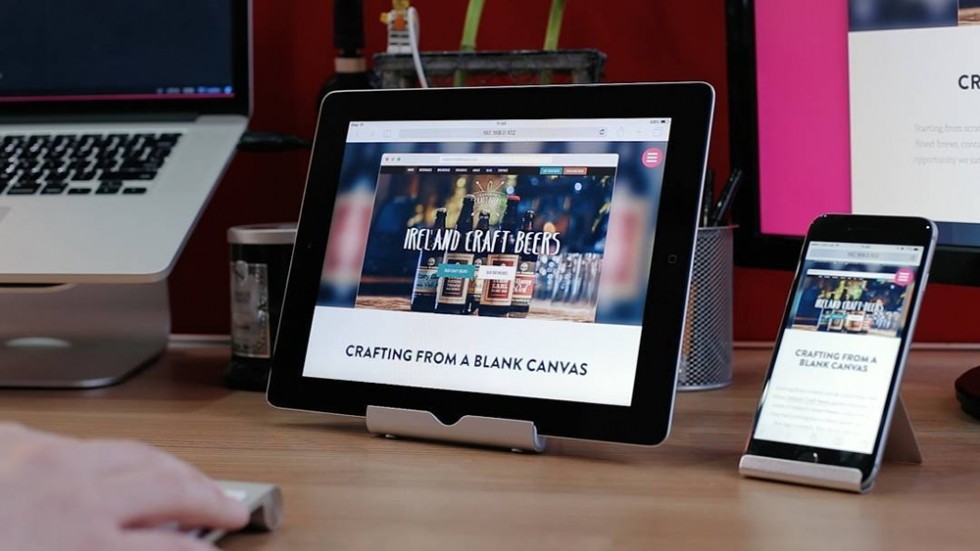Good foundations
by Michael Mallon on April 21st, 2017
So you need a new website and you aren’t sure where to start? A new website can be a valuable tool in your business arsenal. It can help you reach new customers, increase your sales or build an audience. Unfortunately and all too often this is not the case, so how can you make sure you get the most from your website?

Good Planning
As the much overused quote from Benjamin Franklin goes “If you fail to plan, you are planning to fail!”. Without a clear idea of what direction your company is heading in or what you want to achieve, you could end up with a website which does not deliver for you or your customers.
So what can you do to at this early stage to give your website the best chance to achieve its full potential? The simple answer is good planning.
Website Brief
A good website brief will help you communicate your goals and requirements to prospective agencies and serve as the foundation on which the project develops, ensuring you’re always going in the right direction and that you’re targeting the right areas.
So what should you include in your brief? This can vary from company to company depending on the sector or size but in all cases it should be as comprehensive and detailed as possible. Below we have outlined some of the main areas you should cover and why they are important.
Your Business
We know how hard it can be to talk about yourself but tell us a bit about your company, who you are, what you do and how your brand should be portrayed. This will help us better understand you and your goals as a business.
Describe the company:
- What are you called?
- Do you have a lift pitch or mission statement?
- What’s the size of your company?
- How long have you been in business?
- Are you an international company? If so, which countries?
- How would you describe the company in five words (e.g. young, charitable, family, professional, trustworthy)
What is your product or service?
- Describe your products or service as best as possible
- Why it’s different from anything else on the market
- What is unique or exclusive about your product/service
- Why do people choose your products above your competitors?
If it is a large project involving multiple stakeholders who within the organization has final approval for the project? List the key stakeholders, contributors and points of contact within the business
Reasons And Business Objectives For Commissioning a New Website
Do you want more clients, to sell more products or have you updated your branding and need to reflect this on your website? How do you plan to measure the success of a new website? Have you set goals for example 2,000 new subscribers or an increase in sales/website traffic?
Explain what drove the need for a new website:
- Is the existing website dated?
- Has your business strategy changed?
- Are users having difficulty navigating through the site?
- Is it complicated to manage and update?
- Have you updated your branding and want to reflect this?
What goals have you set for your new website:
- Increased traffic
- Increase product awareness
- Increase customer satisfaction
- Generate more sales
- Offer e-commerce
- Advertise a new product or service
Target Audience
Who is your target audience and what will they want to do on your website? Describe the different types of visitors to your website in as much detail as possible.
Who will be using the website?
- Public, trade, staff
- Age group
- Language requirements
- Country/ localisation requirements
- Male/ female
Why are they visiting your website?
- Research
- Information
- Entertainment
- News
- Look up pricing
- Make a purchase
- Get contact details
Why will people choose your site over others?
- Original Informative Content
- Quality Products
- Good Reputation
- Local supplier
- Trustworthy company
By knowing who your target audience is you can make decisions based on what it is they need or want to achieve on your website. If you are unsure about what content to create or features to include, you can relate it back to your target audience and ask if it helps them and if not what would.
Your Current Website (if applicable)
If you already have a website let us know. By understanding why the old website is no longer suitable we can avoid making the same mistakes or if there are successful aspects we can incorporate and improve these.
What is good about the website?
- Good content, for example in depth case studies or service/product pages.
- What features work well, enquiry forms, landing pages?
- The navigation is simple and intuitive
What is bad about the website?
- Outdated design
- Content is no longer relevant
- Does not work on mobiles or tablets
- Hard to update or maintain
Traffic, Sales & Enquiries
- What levels of traffic is it currently receiving?
- In a typical month how many leads, enquiries or sales does your website deliver?
Navigation structure
What pages or sections do you want to include on your new website? You can supply this as a bulleted list or as a sitemap, whichever is easier for you. Start by listing out the main pages on the website (Home, About, Services, Contact) then any sub sections that might be included. If you provide a range of services do you want an individual page for each one? If you plan on having projects, case studies, blogs and products, outline the number of items to be populated for launch.
Not only will this help the web design company understand the size of the project better, it will also help you plan for the functionality and content that will be needed on the website
Functionality and technical requirements
What features will you need and how will these help you achieve the goals you have set?
- Outline what users should be able to achieve onsite
- Does your site need to integrate with any other systems, such as client login areas?
- What types of user interaction, such as comment sections will there need to be?
- Does your site need to be multilingual?
- Should your site have forms and downloads for the user to complete?
- Do you plan on having lead generation pages, white papers, research documents?
- Do you own the domain?
Content
In many cases clients are happy to use the existing content available on their old website. This can be a great starting point but if your current website is not performing then it could be because the content available is not working. Review your content and decide if it meets the needs of your target audience.
The site map you have put together can be a useful resource when planning out your content. Look at the pages or sections you want, for example if you want to showcase previous projects or create case studies, what information do you want to include? Was there a problem that you solved, how did you solve it, what results did it achieve? Should you write in depth case studies or will you create a video? How do your competitors approach this and how can you improve it? This can be applied to any section of the website from the services you provide to the products you sell.
Start thinking about content now, do not leave it until the end of the project:
- Carry out a content audit of your existing website.
- Who will be responsible for generating content?
- Do you need a content writer?
- Can you provide draft content for the different pages and sections?
- Can you provide any brand guidelines?
- Do you have any corporate images, photography or videos?
- Can you provide your logo & corporate identity pack?
In a perfect world, once your project begins you will be able to provide your agency with some draft content for the website. This will allow them to make design decisions based on real content, resulting in a much more successful end product.
The look and feel of the new website
Give the agency a feel for what you like and how you want users to feel about your website. Do you have existing marketing materials the website must compliment, or brand guidelines we must follow? If you do include some examples within your brief.
- How do you want your new website to feel?
- Approachable
- Corporate
- Modern
- Authoritative
- Playful
- Elegant
- Helpful
- Simple
- Your brand colours, fonts
- Do you have Brand or Style guidelines
- Is a rebrand required?
- Example images or materials
It is always a good idea to list three or four websites you like and what it is you like about them, such as colour schemes, imagery, layout, navigation or interactive elements they have included. I would encourage you to look at websites outside of your industry as they can offer a fresh perspective and often are trying to solve similar problems. Are these websites making good use of imagery/video or is the navigation easy to use? Could you incorporate some of these elements into your new website?
Competitors
Your competitors are a great resource when planning your new website. We understand that your product or service is much better than your competitors but in general you are targeting the same customers or offering a similar service/products. So why not let them give you a leg up when planning your new website, improve on what they do well and learn from mistakes they have made? List three or four of your main competitors and tell us what is working and what is not:
- What do you like about the design of their website?
- What do you dislike about the design of their website?
- Is their navigation simple to use?
- Is the content they are providing good or bad?
- Do they have useful features on their website which you could benefit from?
Budget
Letting us know your budget benefits both parties. Taking the budget and requirements into account, we can recommend the best approach to deliver your project. In some situations this might involve suggestions including the removal or changing of certain features to help keep within your budget. If the budget is available we may recommend additional services like digital marketing, photography or content writing where we believe it will benefit your project.
If you are sending out your website brief or proposal to multiple agencies providing a budget will result in better, more accurate responses. If each agency knows the budget and are being asked to quote on the same requirements, when it comes to choosing the right one for you at least you are comparing like with like :)
Timescale
Providing a prefered timeframe will help your chosen agency manage your expectations of what is realistically achievable.
- When are you looking to get started?
- Do you have a hard deadline to be live by?
Other Factors to Consider
There are other very important elements to consider when working on your brief. These can range from general maintenance to marketing. Once the project is complete and you have launched your new website, you want to make sure you get the most from your investment. How do you plan to get your customers onto your new website? There are a number of online and offline marketing activities that you should consider:
- Social media campaigns.
- Search Engine Optimisation (SEO).
- Pay-Per-Click (PPC)
- Email marketing.
- Content marketing – i.e blogs, video content, newsletters, social media.
- Brochures and flyers
- Outdoor advertising
- PR exercises
- Sponsorship
Conclusion
I know it can seem daunting when you sit down to create a brief for a new website but the benefits should result in a much more successful project, meeting both your needs and those of your target market. Obviously not all areas I have covered here will apply to every company and for some companies there will be additional requirements to consider, but I hope this helps or at least gives you a good starting point.
Get in touch
Got a project?
We would love to work with you to make your idea a reality. Start by completing our project planner. This will give us a better understanding of your needs and help us take the first step to creating something special.
Start Your Project Now ➞Alternatively call us on 02895 521 125




